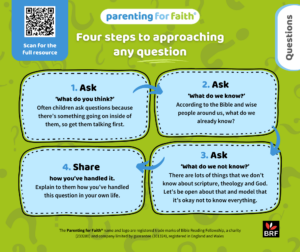Four simple steps to approaching questions your child asks
Encourage your child to ask anything they want. No question is too tricky to take through these steps.
Kids are full of questions, spiritual and otherwise. It’s one of our jobs as parents to answer these questions and help point our kids in the right direction. For some reason, we often get nervous about answering kids’ spiritual questions. We might worry that if we don’t give the right answer we’ll send our children on the wrong track or disappoint them, or we can feel exposed because we’re not theologically smart enough to give the right answer or don’t think we know our Bible well enough.
Let’s remove that stress, because answering our kids’ spiritual questions is one of the most wonderful parts of Parenting for Faith and it’s really simple. You can watch the video, which gives you some worked examples, or just read through the steps below. We’ve also got a postcard download that you can print out and stick on the fridge or save onto your phone, to refer to next time a tricky question pops up. You can use this tool in children’s and youth groups as well as at home, so feel free to share it in your churches too.
Rachel explains four simple steps to take each question through.

Four steps to approaching any question
1. Ask them ‘What do you think?’
Often children ask questions because there’s something going on inside of them, so get them talking first. Listen carefully. There might be a specific incident that has prompted the question or some other motivation that is helpful for you to know. It’s also a good idea to make sure you understand exactly what they are asking; sometimes we misinterpret what they’ve said and start explaining something very complex when what they asked was simple.
2. Ask ‘What do we know?’
This is where we start answering the question. According to the Bible and wise people around us, what do we already know? You might need to go and look some things up together or ask a wise friend when you next see them.
3. Ask ‘What do we not know?’
There are lots of things that we don’t know about scripture and theology, and about God. Let’s be open about that. It’s important to show our children that we are honest with them and we don’t make things up. This models for them that it’s okay not to know everything and that not everything has a simple answer.
4. Share how you’ve handled it.
Help frame for them how you’ve handled this question in your own life. It might be an example of when something happened to you and how you felt about it or just what you think about it at the moment and how you got there. In the midst of what we know and what we don’t, often the key question is about how it affects us. If you can give them a window into how you’ve processed the question, they can start to figure out how they will too.
After going through the four steps, you need to work out what to do next. Decide together if you know what the answer is (or if their curiosity about it has been satisfied for now). If you still don’t know the answer, decide what you’re going to do about it. Options might include:
- going back and chatting to God about it
- making time to ask a wise person that you both trust in your church or family
- looking more at what the Bible says
- just leaving it for now. Remember to let them know that it’s okay not to know all the answers.
You might also be interested in:
- an episode of the Parenting for Faith podcast on Asking Questions with guest Justin Brierley
- ‘Curious questions‘ – how to get to the bottom of things with our kids
- Intellectual wrestlers – how to support young apologists as they want to know the truth

